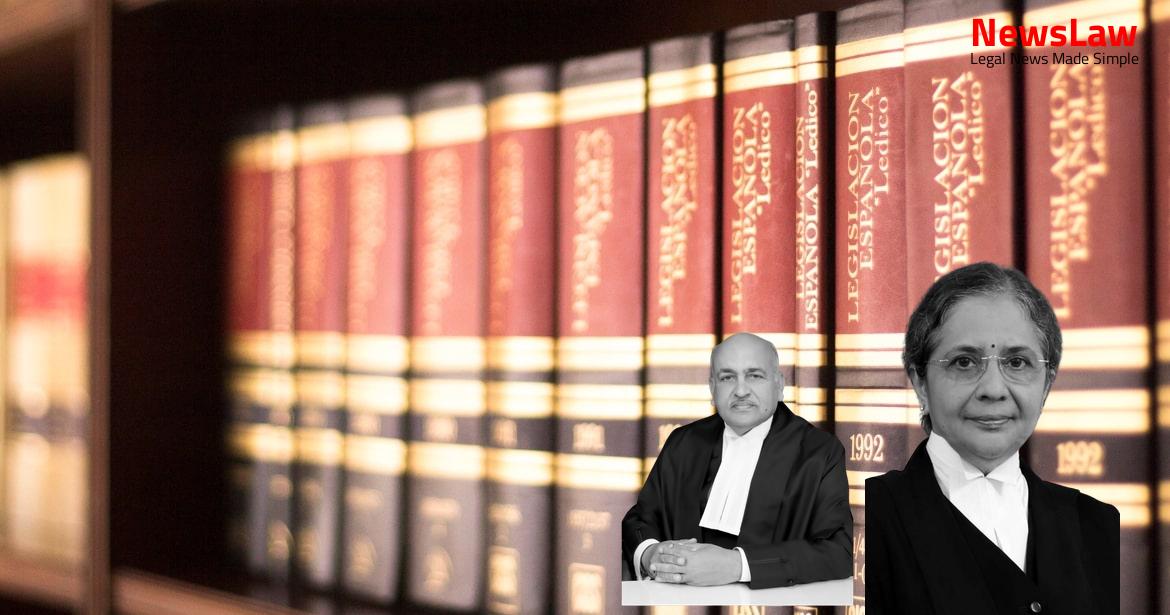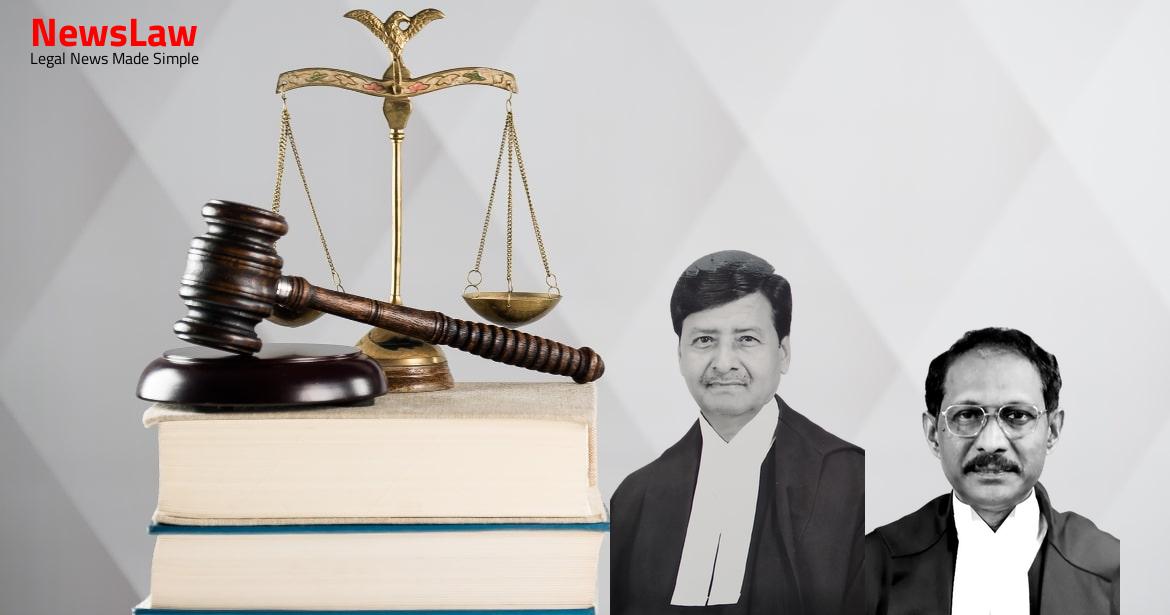Explore the critical legal analysis made by the court regarding the granting of sanction for prosecution in a corruption case. The court’s evaluation of the role of the appointing authority, the timeline for decision-making, and the importance of independent application of mind provides valuable insights into the legal framework governing such matters.
Facts
- The Appellant challenges the order of the High Court of Judicature at Madras.
- The High Court allowed a criminal revision petition filed by the State against an order of the Trial Court discharging the Appellant.
- The Appellant is an official of the Central Secretarial Service, Government of India.
- Allegations of acquiring disproportionate assets between 01.01.2005 to 31.10.2012.
- FIR registered on 20.11.2012 by the CBI against the Appellant and family under IPC and PC Act sections.
- Long delays in seeking and granting sanction for prosecution.
- Various clarifications sought by DoPT from CBI and CVC.
- Discharge application filed by Appellant under Section 227 of Cr.P.C.
- High Court order impugned before the Supreme Court due to alleged lack of application of mind in the sanction order by DoPT.
- CBI sought sanction on 08.09.2015, finally granted on 24.07.2017 after multiple clarifications and delays.
- Trial Court discharge order in favor of Appellant on 13.12.2018.
- High Court held that CVC’s advice on grant of sanction is a function under Section 8(1)(g) of the CVC Act, 2003.
- In a Criminal Revision Petition under Section 397 of the Cr.P.C., the High Court of Judicature at Madras allowed the State’s appeal.
- The High Court deemed the advice of the CVC as relevant material in the grant of sanction.
- DoPT considered advice of CVC along with other relevant material before granting sanction to prosecute the Appellant.
Also Read: Supreme Court Upholds Rejection of Plaint Under Order VII Rule 11 of CPC: A Critical Analysis
Issue
- The first question is whether an order of the Appointing Authority granting sanction for prosecution of a public servant under Section 19 of the Prevention of Corruption Act, 1988, would be rendered illegal on the ground of acting as per dictation if it consults the Central Vigilance Commission for its decision.
- The second question is whether the period of three months (extendable by one more month for legal consultation) for the Appointing Authority to decide upon a request for sanction is mandatory or not.
- The further question in this context is whether the criminal proceedings can be quashed if the decision is not taken within the mandatory period.
Also Read: Validity of Debt and Enforcement of Section 138 NI Act
Arguments
- Shri Jethmalani argued that the grant of sanction by DoPT dated 24.07.2017 lacked independent application of mind.
- He contended that the sanction for prosecution was influenced by the CVC, indicating non-application of mind, thus should be set aside.
- Citing the case of Mansukhlal Vithaldas Chauhan v. State of Gujarat, he emphasized the need for an independent decision in sanctioning prosecution.
- Referring to the cases of Vineet Narain & Ors. v. Union of India & Anr. and Subramanian Swamy v. Manmohan Singh & Anr., he highlighted the three-month limit set by the court for granting sanctions.
- Shri Jethmalani also raised concerns about the two-year delay in granting the sanction for prosecution, from the CBI’s request on 18.09.2015 to the sanction order on 24.07.2017, deeming it fatal and suggesting quashing of proceedings against the Appellant.
- The ASG submits that the issue of the order of sanction being illegal due to non-application of mind was not raised at any point.
- He refers to the Mansukhlal case stating that if the sanctioning authority is compelled to grant sanction, the order will be considered bad due to the discretion being taken away.
- The Special Leave Petition does not contain any ground related to this issue.
- The ASG clarified that the time period for sanction is directory, not mandatory.
- The ASG further argues that the DoPT, while granting sanction, considered the report of the CVC and applied independent mind.
- He mentions that the consequence of non-granting of sanction within three months would result in deemed sanction, not in quashing the criminal proceedings.
- The ASG presented the correspondence between the CBI, CVC, and DoPT to support his argument.
Also Read: Enlargement on Bail in Illegal Mining Case
Analysis
- Non-compliance with a mandatory period should not automatically lead to quashing of criminal proceedings as they serve public interest and the rule of law.
- The opinion of the CVC is advisory, and the appointing authority must endeavor to convey a decision on sanction within the specified timeframe.
- Granting deemed sanction may cause prejudice to the accused rights; therefore, careful consideration and application of mind are essential before granting sanction.
- The Court must balance between the public interest, accountability of authorities, and the rights of the accused.
- Responsibility and answerability of the appointing authority to grant sanction within the specified time are crucial for accountability.
- Legislative incorporation of answerability is evident in the 2018 amendment to the PC Act.
- The consequence of non-compliance with the mandatory requirement of sanction should not lead to automatic quashing of criminal proceedings; accountability measures should be taken instead.
- The CVC plays a supervisory role over the investigation of offences under the PC Act.
- Accountability, responsibility, and enforceability are essential dimensions for ensuring justice and maintaining the rule of law.
- The decision of granting sanction must be based on relevant material, independent application of mind, and good faith.
- Accountability and corrective measures are crucial to address delays or failures in the grant of sanction.
- The statutory scheme aims for an integrated approach among the Cr.P.C, DSPE Act, PC Act, CVC Act, and Lokpal Act.
- The decision-making process of the competent authority should not be influenced by external forces or dictation.
- The mandatory timeframe for granting sanction under the PC Act must be adhered to, and accountability for delays is essential.
- Judicial review ensures accountability of the authority in granting sanction and upholding the rule of law.
- An independent and unbiased decision-making process is vital for maintaining public confidence and integrity in the administration of justice.
- Section 19 of the PC Act requires sanction before prosecution for public servants.
- Delays in granting sanction hinder judicial scrutiny and perpetuate corruption.
- Parliament may consider introducing deemed sanction if decisions are not made within the stipulated period.
- The CVC Act empowers the CVC to review progress on sanction applications.
- Legislative reforms aim to expedite the grant of sanction for prosecution.
- Delays in granting sanction have resulted in the quashing of criminal proceedings in certain cases.
- Strict time limits for granting sanction are necessary to ensure the efficacy of the legal process.
- The CVC Act, the Union Government, the CBI, and the CVC all work towards ensuring integrity in governance.
- No further extensions beyond one month can be granted after reasons are recorded in writing.
- The implementation of clear time limits for granting sanction is crucial for the effective functioning of the legal system.
- The recommendation for a three-month time limit for grant of sanction gained prominence after the Vineet Narain case.
- The Central Government may prescribe guidelines for sanction for prosecution of a public servant.
- The appropriate Government or competent authority must convey their decision on sanction proposals within three months of receipt.
- If legal consultation is needed for sanction, the period can be extended by one month.
- An amendment to the PC Act in 2018 added provisos to Section 19, requiring previous sanction for prosecution of public servants for certain offenses.
- The accountability of the appointing authority for not deciding the request for sanction within time was not established due to lack of material on record
- The appellant is permitted to seek appropriate remedy based on laid down principles
- The learned ASG argued against allowing this plea to be raised, but it was not pursued on a technicality
- The matter could have been examined if necessary material was on record of the case
Decision
- The Criminal Appeal arising out of SLP (Crl) No.1568 of 2022, based on the Judgment of the High Court of Madras in Criminal Revision Petition No. 349 of 2019 dated 06.01.2022, is dismissed.
- The petitioner is allowed to pursue further remedies as per the principles set forth in the judgement.
- Each party will bear their own costs.
Case Title: VIJAY RAJMOHAN Vs. STATE REPRESENTED BY THE INSPECTOR OF POLICE (2022 INSC 1066)
Case Number: Crl.A. No.-001746-001746 / 2022



